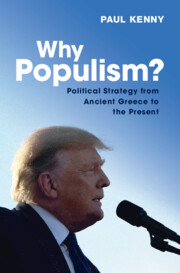
- Cited by 1
-
Cited byCrossref Citations
This Book has been cited by the following publications. This list is generated based on data provided by Crossref.
Kenny, Paul and Bizumic, Boris 2023. Is there a populist personality? Populist attitudes, personality, and voter preference in Australian public opinion. Journal of Elections, Public Opinion and Parties, p. 1.
- Publisher:
- Cambridge University Press
- Online publication date:
- March 2023
- Print publication year:
- 2023
- Online ISBN:
- 9781009275262




